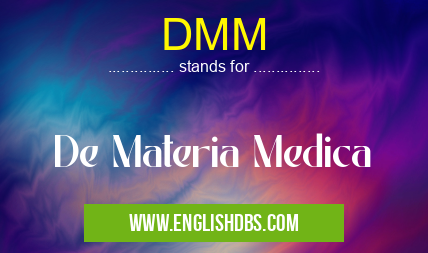What does DMM mean in UNCLASSIFIED
DMM stands for De Materia Medica, a comprehensive five-volume encyclopedia on medicinal plants and their therapeutic uses, compiled by the Greek physician and botanist Pedanius Dioscorides in the 1st century AD. It is considered one of the most influential works on pharmacology and botany in history.

DMM meaning in Unclassified in Miscellaneous
DMM mostly used in an acronym Unclassified in Category Miscellaneous that means De Materia Medica
Shorthand: DMM,
Full Form: De Materia Medica
For more information of "De Materia Medica", see the section below.
What DMM Contains
- Volume 1: Aromatic and volatile plants
- Volume 2: Animals and animal products
- Volume 3: Herbs, roots, and seeds
- Volume 4: Trees and shrubs
- Volume 5: Minerals, metals, and stones
Historical Significance
- DMM was a major source of botanical and medical knowledge for over 1,500 years.
- It provided detailed descriptions, illustrations, and therapeutic recommendations for over 600 plant species.
- Dioscorides' work influenced the development of medicine in Europe, the Middle East, and beyond.
Modern Relevance
- DMM remains a valuable reference for historians, botanists, and medical practitioners.
- It provides insights into ancient medical practices and the origins of modern pharmacology.
- Certain plants and remedies described in DMM are still used in traditional medicine today.
Characteristics of DMM
- Comprehensive: Covers a vast range of medicinal plants and substances.
- Detailed: Provides accurate and detailed descriptions, often with illustrations.
- Therapeutic: Focuses on the medicinal uses and properties of plants.
- Empirical: Based on observations and practical experience rather than theory.
Essential Questions and Answers on De Materia Medica in "MISCELLANEOUS»UNFILED"
What is De Materia Medica?
De Materia Medica is an ancient Greek medical text written by Pedanius Dioscorides in the 1st century AD. It is a comprehensive encyclopedia of medicinal plants, herbs, and other natural substances used in ancient Roman medicine. The text has been used as a reference source for centuries and is still consulted by herbalists and scholars today.
What is the significance of De Materia Medica?
De Materia Medica is significant as it was one of the first comprehensive works on medicinal plants and herbs. It was also the first book to include illustrations of the plants, making it easier for readers to identify and use them. The text provided detailed descriptions of the plants, their medicinal properties, and their uses. It was a major source of medical knowledge for centuries and helped to shape the development of Western medicine.
Who wrote De Materia Medica?
De Materia Medica was written by Pedanius Dioscorides, a Greek physician, pharmacologist, and botanist who lived in the 1st century AD. Dioscorides was a military surgeon who traveled extensively throughout the Roman Empire, collecting and studying medicinal plants. He compiled his knowledge into De Materia Medica, which became a standard reference work for physicians and pharmacists.
What are the main contents of De Materia Medica?
De Materia Medica is divided into five books, each covering a different group of medicinal substances. The first book covers plants, the second book covers animals, the third book covers minerals, the fourth book covers poisons, and the fifth book covers cosmetics. Each book contains detailed descriptions of the substances, their medicinal properties, and their uses.
How has De Materia Medica influenced modern medicine?
De Materia Medica has had a significant influence on the development of modern medicine. It provided the foundation for the study of pharmacology and helped to establish the use of natural products in medicine. Many of the plants and herbs described in De Materia Medica are still used in modern medicine today, and the text remains a valuable resource for researchers and practitioners.
Final Words: DMM is a seminal work in the history of medicine and botany, serving as a foundational text for over 1,500 years. Its comprehensive and empirical approach to medicinal plants has left a lasting impact on the field of pharmacology and continues to provide valuable insights today.
